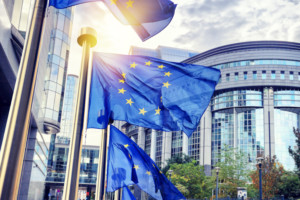 The European Environment Agency (EEA) recently published its new report “Biodegradable and compostable plastics – challenges and opportunities”. The report highlights many positive aspects of biodegradable and compostable plastics. Unfortunately, its interpretation in several media outlets focused exclusively on the few critical assumptions the report makes regarding consumer perception. This resulted in a distorted picture of biodegradable and compostable plastics that doesn’t reflect the general statement of the report. Therefore, in a press release, European Bioplastics (EUBP) underlined the need to acknowledge successful precedents in the deployment of these innovative materials in collaboration with a receptive community of consumers.
The European Environment Agency (EEA) recently published its new report “Biodegradable and compostable plastics – challenges and opportunities”. The report highlights many positive aspects of biodegradable and compostable plastics. Unfortunately, its interpretation in several media outlets focused exclusively on the few critical assumptions the report makes regarding consumer perception. This resulted in a distorted picture of biodegradable and compostable plastics that doesn’t reflect the general statement of the report. Therefore, in a press release, European Bioplastics (EUBP) underlined the need to acknowledge successful precedents in the deployment of these innovative materials in collaboration with a receptive community of consumers.
Commenting on the report, François de Bie, Chairman of EUBP, stated: “In several respects, the EEA report is laudable in its objectives to provide information about the types of biodegradable products available, their labelling and their properties. It also accurately highlights the need to raise awareness about the different packaging solutions to ensure proper sorting and collection of waste”. In terms of additional benefits, the EEA correctly notes that contamination with conventional plastics is an increasing challenge for compost quality and emphasises that substituting conventional plastics with certified compostable plastics can significantly help in reducing this risk. Compostable plastics are essential in this respect of recovery and recycling, since no other economically viable solutions will be available for food-contaminated plastics in the near future.
The report also correctly stresses that using compostable plastic bags increases the capture rate of food waste, since consumers find them convenient and practical to use. Many municipalities and waste collectors are, therefore, already recommending or requiring the use of certified compostable plastic bags for collecting bio-waste. In agriculture, biodegradable mulch films, which contribute to sustainable farming practices, are also identified as a key solution in avoiding long-term plastic accumulation in soil.
However, on the consumer side, the report also casts doubt around the potential for understanding how and where bioplastics should be dealt with when it comes to end-of-life options. It neglects to reflect that all biodegradable plastics, with the exception of agricultural mulch films which are recycled in situ, are clearly intended for organic recycling. Whilst opponents of bioplastics often claim that consumers will be unable to differentiate between bioplastics intended for home or industrial composting, the evidence points to the contrary where clear labelling, communication and effective sorting are put in place. In the Milan area, the collection of biowaste using compostable plastics is mandatory since 2012. In particular, Italy has demonstrated that compostable plastics are efficiently collected and recycled in composting facilities, as recently reported by the Italian Composting Consortium. Unfortunately, however, media coverage of the report almost exclusively focused on the critical consumer perception aspect. At the same time, it was ignored that EEA assessed that there is no evidence supporting the fear that consumers might misunderstand biodegradability or compostability claims as a ‘license to litter’.
Although mechanical recycling provides solutions for certain applications, it is far from a “one-size-fits all“-answer to the question of how to ensure that plastics fulfil their potential in a circular economy. In fact, in reality it is more complex, with a multitude of solutions needed in order to enable resource-efficiency, as outlined in a recent report from Systemiq and the Pew Charitable Trust. In this respect, organic recycling represents an unparalleled potential for diverting unavoidable food waste from landfill, facilitating the shift towards a circular economy, and bringing benefits for more sustainable agriculture through the generation of high-quality compost for soil enrichment.
It is paramount that the transition towards a greener economy accelerates further and that biodegradable and compostable plastics can play an important role in achieving this goal. Therefore, it is important that the relevant stakeholders enter into a constructive dialogue over biodegradable and compostable plastics that is based on science rather than on ideology.